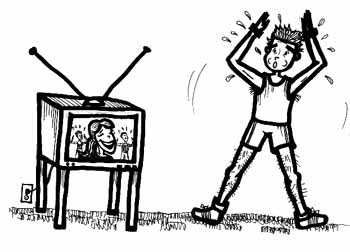Sloth
excerpted from a novel
By Mark
Goldblatt
The
anti-hero of his own life, he pursues perfect love.

"I
will woo her by the pen . . .
and thereafter bed her by the sword."
Now these are the most opportune of circumstances. Daylight. Eye-contact. The wry monotone of a sane man's voice to offset the act. What I propose is something far more difficult. For I have fallen in love with an exercise girl named Holly Servant who appears every morning on television. What I propose is to woo her. To woo her from afar at first, to woo her with the words love has written upon my heart. To woo her by the pen--for e-mail is too ephemeral, too case-insensitive, to convey the substance of what I feel. Abelard to Heloise@mortalcoil.net? I think not! No, the pen it is. I will woo her by the pen . . . and thereafter bed her by the sword.
The air was khaki today on West 44th Street. Perhaps the soot on the window had prismed the remnants of sunlight, or perhaps it was the neon-skewed dusk of Times Square at an angle I had not observed before. No matter, I opened the window and breathed khaki air. It smelled of engine fluid, of engine fluid and fresh pralines. Sticky poison. But it was air, so I inhaled deep gulps of it. Four stories down, I watched a man in gray overalls as he stared under the hood of his truck. Steam rose around his head, khaki-tinted steam. He wiped his forehead with a gray rag.
There was a cluster of taxis at the intersection of Broadway and 44th. Their horns were silent. Rush hour had passed. Now was the hour of khaki air, the hour of sticky poison and silent cabs and twilight. Saxophone music came up the street; it was from the blind man who worked the southeast corner across from the praline cart. He played the same songs on the same street corner every afternoon, four o'clock to eight o'clock, rain or shine; this was his final song, "Yesterday." As the saxophone sounded, a homeless woman in a Yankees cap suddenly began to sway back and forth and sing:
There's a dog in the house.
There's a dog in the house.
There's a dog in the house.
There's a dog in the house.
There's a dog in the house.
There's a dog in the house.
As I leaned farther out the window, I felt a sudden drop of water on my head. The sky was cloudless, the khaki air darkening to black; I squinted at the last traces of sunlight across the Hudson River. Then another drop of water hit me. The drops of water took several seconds to worm their way through my hair to my scalp. Then I felt for them, the drops of water, with my fingertips. They were gritty. They had fallen from the air conditioner one floor above my window. As soon as I glanced up, another drop of water hit me in the eye.